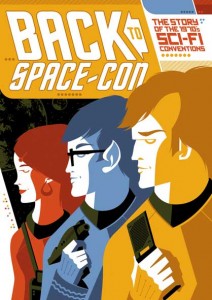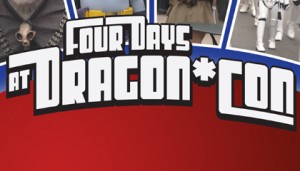 This weekend I had the opportunity to watch two documentaries, Back to Space-Con, produced and directed by Tom Wyrsch of Garfield Lane Productions, and Four Days at Dragon*Con, produced and directed by Jack Walsh of Public Broadcasting in Atlanta. Taken together, these films tell the story of the development of science fiction and fantasy conventions, which over time have become significant, not only for entertainment and commercialism, but also in the formation of distinct subcultures.
This weekend I had the opportunity to watch two documentaries, Back to Space-Con, produced and directed by Tom Wyrsch of Garfield Lane Productions, and Four Days at Dragon*Con, produced and directed by Jack Walsh of Public Broadcasting in Atlanta. Taken together, these films tell the story of the development of science fiction and fantasy conventions, which over time have become significant, not only for entertainment and commercialism, but also in the formation of distinct subcultures.
Back to Space-Con looks at one of the earliest Star Trek conventions from the 1970s. The first event was called “The Red Hour Festival,” a name inspired by a time of revelry and abandon from the original Star Trek series episode “The Return of the Archons.” This convention took place on February 22, 1975 and was held at Lincoln High School in San Francisco. For those who only have familiarity with contemporary conventions, whether science fiction, fantasy, or horror, and the widespread media exposure in niche communication channels that these gatherings receive, whether from magazines, the Internet, Facebook, specialized satellite and cable television channels, and other venues, back in the 1970s none of these media channels existed, with the exception of a small handful of specialized magazines. I remember this situation as a teenager and fan of the fantastic growing up in northern California. We had to work hard to find out about conventions, and about other fans that might share our peculiar interests.
As Back to Space-Con documents, local horror host Bob Wilkins of the Creature Features program on Channel 2 in the Bay Area, and later Channel 40 in Sacramento, promoted “The Red Hour Festival” on his television program, and also served as master of ceremonies at the event. The result was a huge turnout of fans, many with home-made costumes from the television series, as well as props such as phasers and tricorders made in home garages, long before Hollywood recognized there was a mass market for such items and concerns over copyright and royalties became an issue as it would in the post-Star Wars era shortly to come. Wilkins would continue to promote the events, as would his eventual successor on Creature Features, John Stanley. The result was an was an ongoing and increasingly successful series of conventions, and a burgeoning and influential fan base. As the Back to Space-Con website states:
These “Space-Con” conventions left an indelible mark on the science-fiction fans and “Trekkers” who attended. In the end, conventions like Space-Con helped awaken Paramount from hibernation and led to the creation of the first installment of the major motion picture series “Star Trek” in 1979. This full-length documentary film is the story of how fandom revolutionized an industry.
Back to Space-Con provides not only a sense of nostalgia for those of us who lived through these times of being a fan, but also helps us understand the origins of contemporary sci-fi and fantasy conventions and the significance of fandom not only as an element connected to entertainment and commercialism, but also in how certain aspects of the fantastic move from individual fandom to the formation of collective subcultures.
Fast forward from the 1970s and fledgling science fiction conventions to the contemporary period, and shift from California to Atlanta, add several thousand more fans in attendance (at least 35,000 in total by one estimate), and you have Dragon*Con. Four Days at Dragon*Con explores this convention which has been in existence for twenty-four years, and which someone in the documentary calls “Woodstock for nerds.” Dragon*Con makes for an interesting contrast with Comic-Con, in that while both  events draw fans and feature aspects of pop culture from science fiction, fantasy, and even horror, Dragon*Con, much like the Space-Cons which preceded it, gives the impression that it is far more fan-driven than media and commerce-driven. This is not to say that there is not a strong driving force of entertainment and commercialism behind Dragon*Con, but it appears to focus more on explorations and expressions of fandom as a result of the fantastic, rather than serving primarily as a means for promoting the latest Hollywood products of the fantastic.
events draw fans and feature aspects of pop culture from science fiction, fantasy, and even horror, Dragon*Con, much like the Space-Cons which preceded it, gives the impression that it is far more fan-driven than media and commerce-driven. This is not to say that there is not a strong driving force of entertainment and commercialism behind Dragon*Con, but it appears to focus more on explorations and expressions of fandom as a result of the fantastic, rather than serving primarily as a means for promoting the latest Hollywood products of the fantastic.
The press release for this documentary brings out one of the significant facets of this for Dragon*Con, and I believe this element was also present at the initial formation of such conventions in the 1970s, and also serves as the foundation for fan subcultures.
“One thing we wanted to explore was the real reason people gather here in such numbers,” said the documentary’s director, Jack Walsh. “It couldn’t be just to talk about sci-fi”. Walsh co-produced Four Days at Dragon*Con with Gordon Ray, PBA30’s Senior Producer.
“It became pretty clear early on that this was a sense of acceptance,” said Walsh. “For 361 days out of the year, they might be dismissed as nerds, but when these fans come together on such a massive scale, they form their own like-minded community that just happens to be larger than a lot of towns.”
After watching both of these documentaries, and reflecting on the resulting fan subcultures that have arisen over time as a result, I was struck by the similarities to my research on Burning Man Festival which I did for my masters thesis. Burning Man is an alternative cultural event which meets each year in the Black Rock Desert of Nevada. Although it began with a handful of participants from its humble origins on a San Francisco beach, it has grown to become an international phenomenon that creates a temporary city and subculture each year.
Some of the parallels between Burning Man Festival and fan conventions/subcultures like Dragon*Con include:
– A sense of belonging, family, and being part of a like-minded group that shares similar values.
– Related to the above, a shared sense that their participation in the festival/convention represents being part of a subculture more real than that lived in the rest of the year.
– A process which Victor Turner discussed which involved leaving one’s tribe, traveling to a liminal space apart, participation in various forms of ritual, and a return to the tribe after experiencing a strong sense of “communitas” or community from the shared experience.
– The inclusion of a strong sense of artistic expression through painting, drawing, sculpture, and the creation of various forms of artifacts.
– Costuming and play. At Burning Man this can take a variety of forms, from nudity to any number of costumer creations, while at sci-fi/fantasy conventions it becomes “cosplay,” costume play as a form of performance art related to the fantastic.
– A strong sense of participation and self-expression in keeping with embodied ideals as the driving force behind the gatherings.
– A sense of modern tribalism, a connectedness in terms of shared understandings of social and (sub)cultural values.
– Utopian desires which yearn for the creation of forms of society which transcend the limitations and overcome the negative aspects of contemporary Western societies.
These documentaries are “must viewing” for fans, as well as students and scholars of the fantastic, media studies, and fan cultures. Back to Space-Con can be ordered from Tom Wyrsch here. Unfortunately, Four Days at Dragon*Con is not available for purchase, but it is airing nationally at the discretion of local public broadcasting stations. Visit the documentary’s Facebook page, as well as its American Public Television page for possible broadcast times near you.
Related posts:
“WIRED: Is Being a Geek a Personality Trait or a Way of Life?”
“And the Geeks Shall Inherit the Earth, or at Least Lead Pop Culture”





2 Responses to “Fan Culture Documentaries: Back to Space-Con, and Four Days at Dragon*Con”